Fashion in the Philippines has always been a vibrant mix of tradition and modernity. Over the years, American clothing styles have played a significant role in shaping the way Filipinos dress. From graphic tees to tailored pants, these influences have created a unique blend that honors cultural roots while embracing global trends.
The evolution of Filipino fashion reflects a dynamic interplay between local and Western aesthetics. American trends, introduced through media and migration, have inspired new styles that resonate with Filipino women. Today, online shops and new arrivals make it easier than ever to explore these fresh looks.
Consumer preferences have shifted over time, with many Filipinos incorporating American-inspired pieces into their wardrobes. This fusion of styles not only highlights the adaptability of Filipino fashion but also celebrates its rich cultural heritage.
Key Takeaways
- American clothing styles have significantly influenced Filipino fashion.
- Modern Filipino fashion blends Western trends with local traditions.
- Key items like graphic tees and pants play a role in creating contemporary styles.
- Online shops and new arrivals make it easy to access these trends.
- Consumer preferences continue to evolve under American influence.
Introduction: Merging American and Filipino Fashion
American trends have seamlessly blended with Filipino traditions, creating a unique fashion identity. This fusion reflects a synthesis of cultural identities, where Western influences meet local heritage. From graphic tees to tailored pants, these styles have become staples in modern Filipino wardrobes.
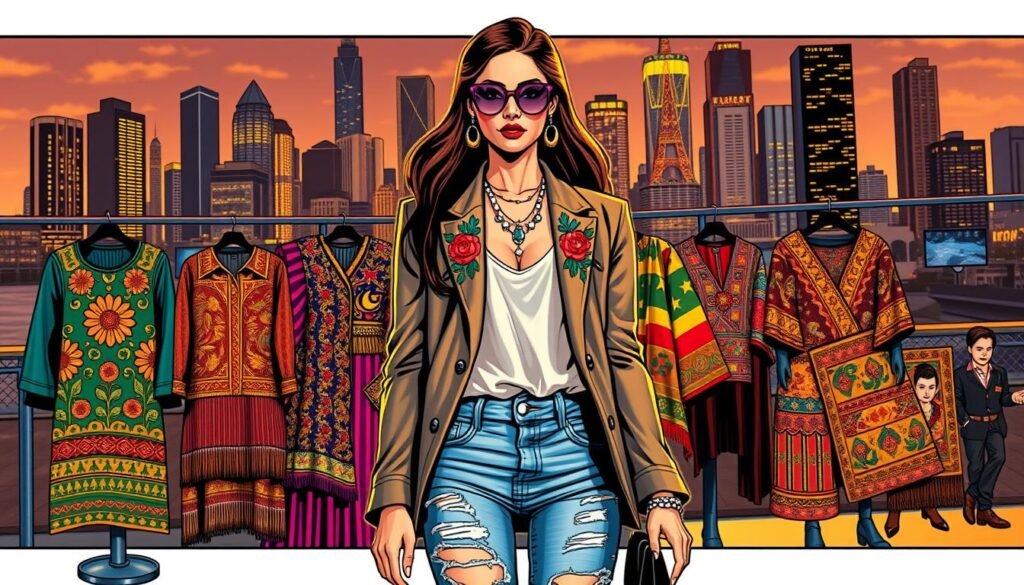
Digital retail has played a significant role in this fashion evolution. Online shops and new arrivals make it easy for Filipinos to access the latest trends. Women, in particular, have embraced this blend, incorporating modern cuts and styles into their daily wear.
Popular items like short tops and pants showcase this cultural merge. These pieces highlight the adaptability of Filipino fashion while honoring its roots. Accessible shopping options, including sales and size variety, have further supported this trend.
This blend of American and Filipino styles sets the stage for a deeper exploration of its historical roots and practical applications. It’s a testament to how fashion can bridge cultures and create something entirely new.
The Historical Journey of American Fashion in the Philippines
The Philippines’ fashion evolution is deeply rooted in its historical encounters with American culture. From colonial times to today, American styles have shaped the way Filipinos dress, blending tradition with modernity. This journey reflects a fascinating interplay of history, trade, and cultural exchange.
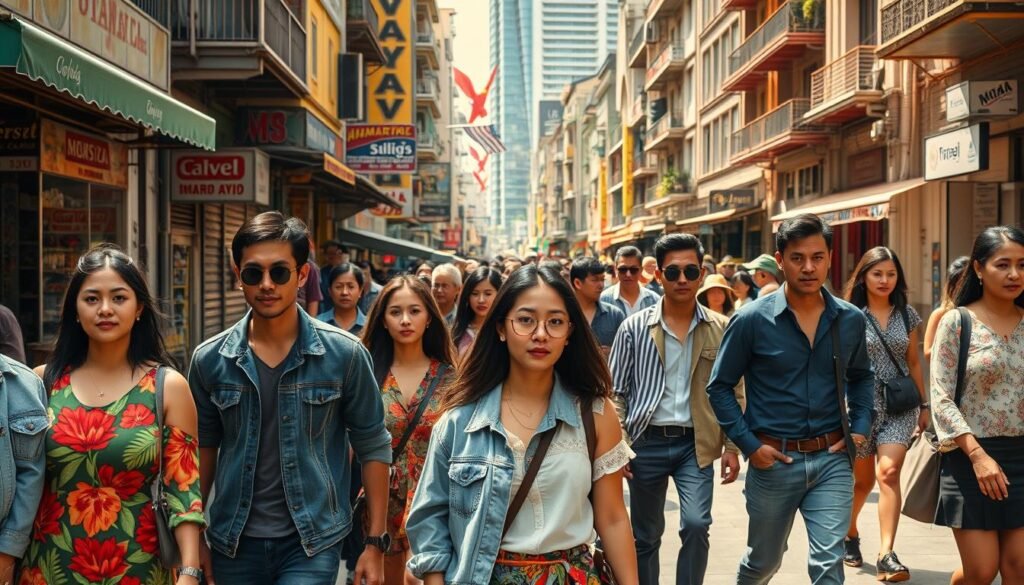
Colonial Roots and Post-Colonial Transitions
During the American colonial period, Western clothing styles began to influence Filipino wardrobes. Items like pants and short tops became popular, marking a shift from traditional garments. This era laid the groundwork for adopting American fashion elements.
Post-colonial transitions saw Filipinos embracing these styles even more. Trade and migration played a key role in popularizing American trends. For instance, the introduction of jeans and T-shirts in the mid-20th century became a cultural staple.
Globalization and the New Wave of Trends
Globalization accelerated the spread of American fashion in the Philippines. Technological advances and media exposure made it easier for Filipinos to get the latest trends. Online shops and new arrivals further fueled this wave.
Today, Filipino women often incorporate American-inspired pieces into their wardrobes. From casual wear to formal attire, these styles highlight the adaptability of Filipino fashion. The rise of women clothing brands has also made it easier to find the perfect size and fit.
This historical journey continues to influence modern consumer behavior. Whether it’s a sale on trendy pants or the latest new arrivals, American fashion remains a significant part of the Filipino style narrative.
Clothing: The Intersection of Style and Culture in the Philippines
In the Philippines, fashion serves as a bridge between cultural heritage and contemporary trends. From traditional weaves to modern cuts, clothing reflects a dynamic blend of history and innovation. This unique fusion allows Filipinos to express their identity while embracing global influences.
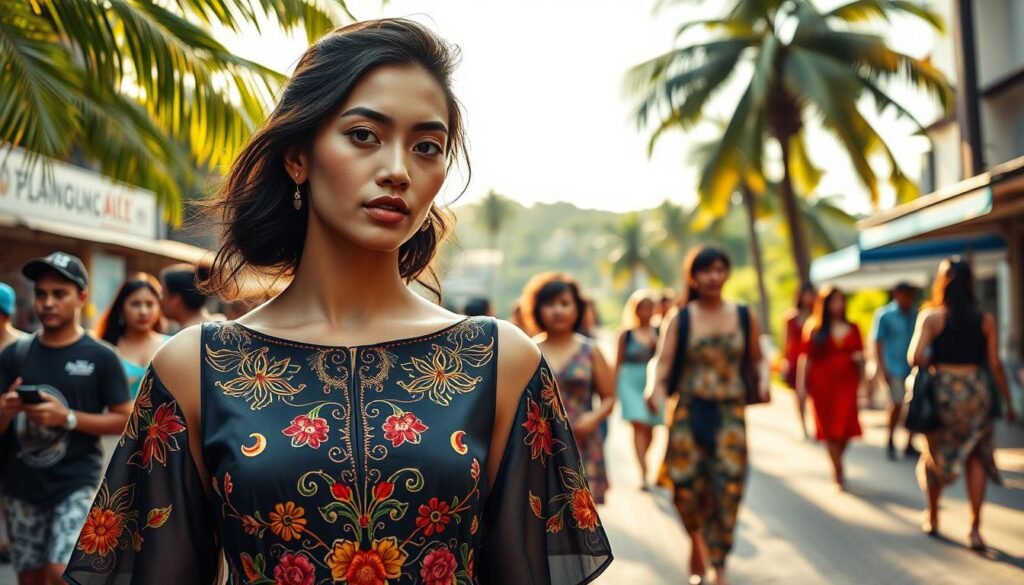
Cultural Identity and Fashion Expression
Filipino fashion is deeply rooted in its cultural identity. Traditional motifs, like the kusikus pattern from Ilocos, blend seamlessly with modern designs. These patterns often symbolize unity and nature, reflecting the country’s rich heritage.
Modern cuts, such as short tops and tailored pants, have become popular among women. These pieces showcase the adaptability of Filipino fashion, balancing tradition with contemporary style. The result is a wardrobe that honors the past while looking to the future.
Consumer Behavior in Today’s Philippine Market
Consumer preferences have shifted significantly in recent years. Online shopping has become a dominant force, with platforms offering new arrivals and sales that cater to diverse tastes. This shift has made it easier for Filipinos to access global trends while supporting local brands.
Size and fit are critical considerations for today’s shoppers. Consumers demand both comfort and style, driving brands to offer a wider range of options. From casual pants to elegant dresse, the market caters to every need.
| Aspect | Traditional | Modern |
|---|---|---|
| Design | Geometric patterns | Contemporary cuts |
| Material | Handwoven fabrics | Synthetic blends |
| Usage | Special occasions | Everyday wear |
This balance between tradition and modernity defines Filipino fashion today. Whether shopping online or in-store, consumers continue to seek styles that reflect their unique identity.
Styling American Influences in Filipino Wardrobes
American fashion trends have found a strong foothold in Filipino wardrobes, blending seamlessly with local styles. From casual wear to formal attire, these influences have reshaped how Filipinos approach their daily outfits. This section explores the top fashion picks inspired by American trends and how new arrivals and sales impact consumer choices.
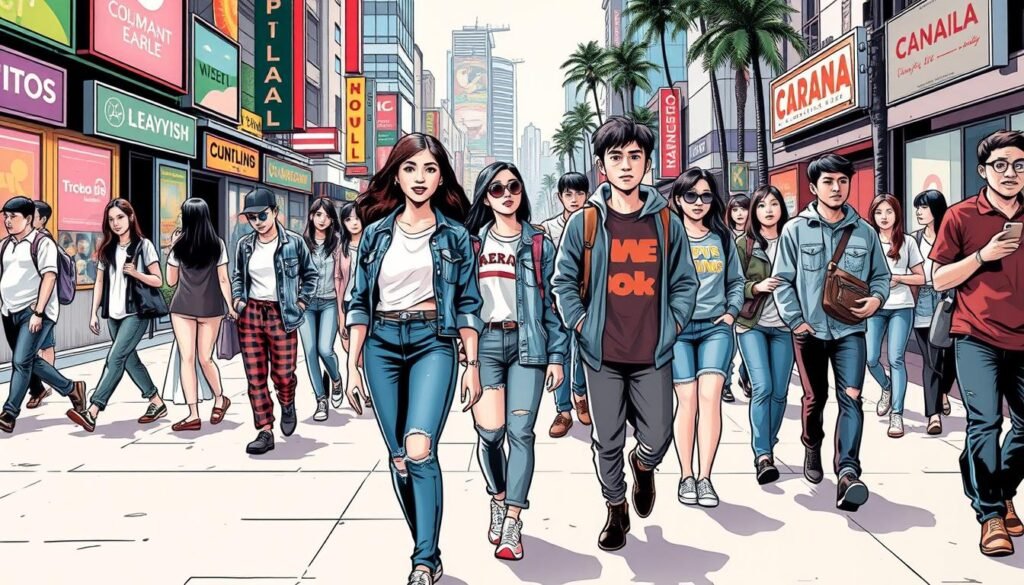
Top Fashion Picks Inspired by American Trends
Filipino consumers are embracing American-inspired pieces that combine comfort and style. High-waisted OGC Chino Shorts, priced at ₱1,200, are a top choice for their versatility. Pair them with a graphic tee for a casual look or a tailored blouse for a more polished outfit.
Another popular item is the classic denim pants, available in various cuts and sizes. These pants are perfect for creating a modern yet timeless wardrobe. For women, floral printed dresse inspired by 1930s American fashion are making a comeback, offering a blend of elegance and comfort.
Insights from New Arrivals and Sales
Online shops play a significant role in introducing new arrivals to Filipino consumers. Platforms like Shop Cambio offer a wide range of options, from casual wear to formal attire. Sale events, such as end-of-season discounts, encourage shoppers to get the latest trends at affordable prices.
Here’s a quick overview of popular items and their prices:
| Item | Price (₱) |
|---|---|
| High-Waisted OGC Chino Shorts | 1,200 |
| Graphic Tees | 800 |
| Denim Pants | 1,500 |
| Floral Dresses | 2,000 |
To style these pieces, consider mix-and-match strategies. Pair a graphic tee with high-waisted pants for a casual yet chic look. Add a blazer for a more formal touch. These combinations highlight the adaptability of American-inspired fashion in Filipino wardrobes.
For more insights into the historical roots of this fashion blend, explore this detailed analysis.
Practical Tips for Adapting American Fashion Locally
Adapting American fashion to local tastes in the Philippines requires a thoughtful approach. By blending modern trends with traditional elements, Filipinos can create a unique style that reflects their cultural heritage. Here are some practical tips to help you achieve this balance.
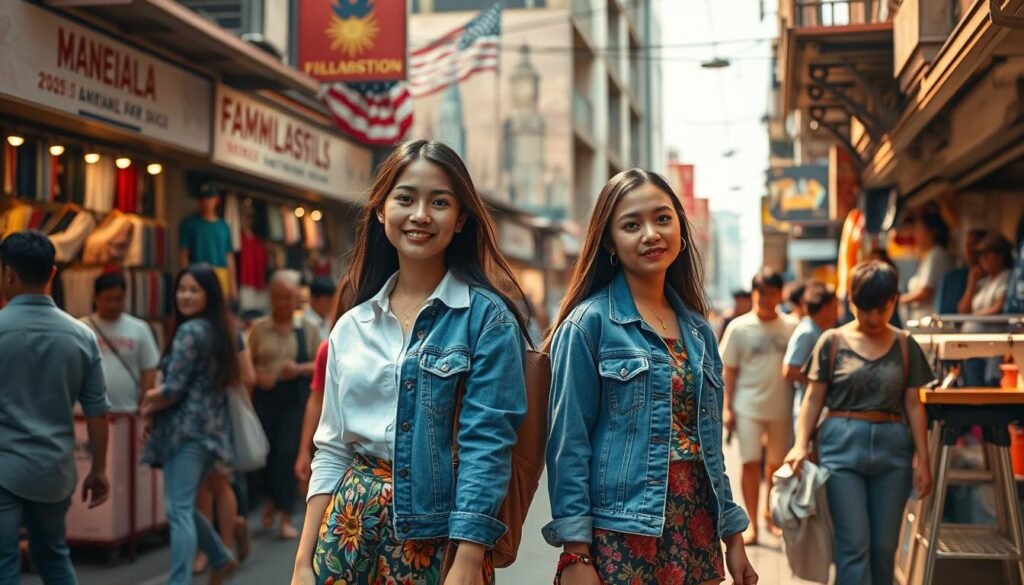
Choosing Outfits That Balance Modern and Traditional Elements
Start by selecting pieces that combine American trends with Filipino aesthetics. For example, pair a short top with a traditional wrap skirt for a modern yet culturally rich outfit. This approach allows you to embrace global styles while honoring local traditions.
When shopping online, look for new arrivals that feature versatile designs. Items like tailored pants or floral dresse can be styled in multiple ways, making them perfect for various occasions. Don’t forget to check sale sections for affordable options.
Integrating Comfort and Aesthetic Appeal
Comfort is key when adapting American fashion to the local climate. Choose lightweight fabrics like cotton or linen for everyday wear. These materials are breathable and suitable for the Philippines’ tropical weather.
For a polished look, invest in well-fitted pieces that flatter your body type. A woman’s wardrobe can benefit from versatile items like high-waisted pants or a tailored blazer. These pieces can be dressed up or down, making them ideal for both casual and formal settings.
Here’s a quick guide to help you adapt American fashion locally:
| Tip | Example |
|---|---|
| Mix modern and traditional | Pair a graphic tee with a traditional skirt |
| Prioritize comfort | Choose lightweight fabrics like cotton |
| Invest in versatile pieces | High-waisted pants or a tailored blazer |
| Check online shops | Look for new arrivals and sale items |
By following these tips, you can create a wardrobe that blends American trends with Filipino culture. For more insights into consumer trends affecting fashion brands, explore this detailed analysis.
Conclusion
American fashion has left a lasting mark on Filipino style, blending seamlessly with local traditions. From tailored pants to casual short tops, these trends have reshaped wardrobes across the Philippines. The rise of online shops and new arrivals has made it easier than ever to stay updated with the latest styles.
Filipino women, in particular, have embraced this fusion, creating outfits that balance modernity with cultural heritage. Whether it’s a sale on trendy pieces or the latest wear, consumers can now get their favorite looks with just a few clicks. This dynamic blend continues to evolve, offering endless possibilities for personal expression.
As fashion continues to bridge cultures, the key is to find a style that feels authentic. Explore new trends, mix and match, and let your wardrobe reflect your unique identity. For more insights on creating a versatile wardrobe, check out this guide.
FAQ
How has American fashion influenced Filipino style?
American fashion has shaped Filipino style through globalization, introducing trends like casual wear, denim, and sportswear. These influences blend with local traditions, creating a unique fashion identity.
What are some popular American-inspired clothing items in the Philippines?
Items like graphic tees, jeans, sneakers, and oversized tops are widely popular. New arrivals often feature these styles, especially during sales, making them accessible to many.
How can I incorporate American trends into my wardrobe while staying true to Filipino culture?
Pair modern pieces like shorts or pants with traditional accessories or fabrics. This balance keeps your outfit stylish while honoring cultural roots.
Where can I shop for American-inspired women’s clothing in the Philippines?
Many online shops and local boutiques offer new arrivals inspired by American trends. Look for sales to find affordable options that fit your style.
What should I consider when choosing outfits with American influences?
Focus on comfort and aesthetic appeal. Select pieces that suit your body type and lifestyle, ensuring they align with both modern and traditional elements.
How do sales and new arrivals impact fashion choices in the Philippines?
Sales and new arrivals make trendy items more accessible, encouraging Filipinos to experiment with styles like dresses, tops, and casual wear inspired by American fashion.
Source Links
- Looking Back At A Filipino American History Of Fashion
- Filipino American fashion
- Looking Back At A Filipino American History Of Fashion
- Bay Area Filipino American fashion designers using historical influence as inspiration
- Fabricating Filipino Nationalism: Deconstructing Filipino nationalism through Fashion
- Fashion and clothing in the Philippines
- Stories from My Great-Lola’s Terno: A History of Family, Fashion, and the Philippines
- 1930s Filipinos Were Hip to American Style. There Was Backlash. – JSTOR Daily
- The Geometry of Philippine Textiles
- How The Philippines’ Kandama Collective Celebrates Ifugao Heritage Through Fashion
- Looking Back At A Filipino American History Of Fashion
- Fashion and the Declaration of Independence – Philippines Graphic
- The Filipino American creatives who are reclaiming the barong | CNN
- Follow these simple steps to become more sustainable with your fashion
- Adapting to Consumer Preferences in Fashion
- Adaptive Fashion 101
- School uniform and clothing guidance: child rights and wellbeing impact assessment
- Corsets Conclusion – Fibre2Fashion
- Conclusion – Dress Cultures in Zambia

